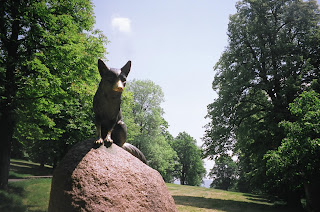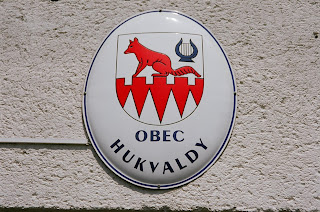With the academic year recently under way, and the usual overload of clashing events on the London concert/opera scene, now seems like as good a time as any to launch the self-indulgence of a blog. I've spent too much time on the Radio 3 Message Boards trying to wave a shining sword against the nay-sayers, usually in vain, so I might as well use it more productively.
My City Lit 'Opera in Focus' course, mostly for the curious leisured classes, kicked off its nineteenth season two Mondays ago. The debate continues as to what we ought to be. Swimming as we do in a sea of vocational subjects designed, as the government believes, to get people in to work, is there any place for plain old musical appreciation and (tell it not in Gath) a series of lectures preface by a fair swathe of discussion about who's seen what? The powers tell me to encourage more 'open-ended questioning' and to split the students into groups for discussion. The students reject that vociferously - 'we've come here to learn from you, not to listen to each other' - and I can't help feeling that if we did more of what was asked, those who hold forth would continue to dominate, and those who remain silent would still keep mum. Anyway, the proof is in the healthy enrolment: the class fills its quota of 32 students on the day booking opens, and there's a waiting list almost as long again.
I was doubtful about the first choice of the two operas this term: Gluck's
Iphigenie en Tauride. Mozart he may not be, but his 'noble simplicity' has virtues of its own. There's so much to talk about around the subject: the reforms of the 1760s and '70s, the Euripides original, the variant versions of the Iphigenia myth whereby Agamemnon's daughter may have been slain by her own father to get the Greek fleet sailing from Aulis, or rescued by Artemis/Diana and whisked off to the Crimea. But does the opera hold up as drama? Saw the concurrent show at the Royal Opera on Tuesday: just about the most austere production I've ever come across, and this from director Robert Carsen who usually goes in for hauntingly lit, handsomely costumed
mises en scene. Here, all wear black on a dark set; a blinding light only dawns in the last two minutes, when the leading characters stumble off disoriented. The opening scene, a protracted storm complete with vocal laments from Iphigenia and her fellow priestesses is brilliantly done in violent dance: the cycle of murders - Iphigenia by Agamemnon, he by Clytemnestra, she by Orestes - chalks up the names on the walls as the characters are flung against them. There is great music in Act 2, Orestes' false calm before the Furies return to haunt him, Iphigenia's aria of grief for the brother she believes lost. But the evening crumbles rather in its second half, and Gluck seems to throw away the great recognition scene in bald accompanied recitative. I've since spent time with the Eliot Gardiner recording, and Diana Montague makes a more plangent heroine than the robust Susan Graham. There's some coarsening of Simon Keenlyside's often excellent baritone; he makes the quiet scene of uneasy peace very moving, but flings himself around in too consciously actorish a way. Ed Seckerson noted in his Independent review that less would be more.
So I came away ultimately underwhelmed. Since then, though, fishing around the subject has proved fascinating: I've tracked down Maria Wimmer in speeches from Goethe's play, called forth the student with the finest speaking voice to read from Euripides and discovered three songs by Schubert characterising Iphigenia and Orestes. The furies scene will be interesting to set alongside Gluck's Orfeo and the underworld scene in
Alceste.
So, yes, I'm engrossed by this, as I have been by going through the Sibelius symphonies from first to last in writing notes for Esa-Pekka Salonen's forthcoming Barbican series. Sibelius's diaries around the Fourth and Fifth make for singular reading. On Friday I had to speak on Bruckner 7 before the BBC Symphony Orchestra's first Barbican concert of the season, and the performance - very firm of purpose under first-rate Belohlavek - had me thinking of an interesting connection. Sibelius writes of his symphonies as 'confessions of faith from different periods of my life'. Yet so often they're defined in terms of evoking Finnish landscapes. As in Bruckner, there are great ruptures and chasms: as I listened to those terrifying unisons in the finale of Bruckner 7, it struck me that I'd tended to compare them to craggy Alpine rock-faces - but Belohlavek made it clear by stressing the anguished viola wails just before they occur that this was an inner crisis of faith. It's the same with Sibelius: so in the case of both composers, couldn't two things be happening at once - an inner landscape which finds its expression in the outward landscape with which both composers were in such close touch?
Talking to my good friend Stephen Johnson about these two composers, whom he knows so well, confirmed I was on the right track with a lot of what I'd written about Sibelius. We agreed, there is no more complicated genesis in the history of the symphony - including Bruckner's agonised rethinks - than that of the Fifth, the final version of which says almost the opposite of the tormented original. We also talked about the Wagner quotations in Bruckner. He persuaded me that the horn in the Seventh's slow movement really is quoting
Tristan. It could be just a coincidental chromatic ascent, were it not for the fact that it's in the same key as the 'glance' motif in the
Tristan prelude.
Originally I had a quarter of an hour at the Barbican to talk about Bruckner and Wagner (which seemed like a good idea, given that the Ring is in full swing at Covent Garden as I write). Chris Larkin from the orchestra was going to come on with two Wagner tubas (tenor and bass) for the next fifteen minutes. He's an excellent speaker as well as a fine player and had worked out in detail what we'd cram into that short spot. But a two-hour journey home after the morning's rehearsal, courtesy of the Northern Line, had blitzed him, and he pulled out at 3pm. No matter - the time was easily filled. Then, for the last third, I was to talk to thirtysomething composer Joerg Widmann about
ad absurdam, his 'concert-piece' for trumpet and small ensemble. I heard it first on Friday afternoon: it's alive, like the best of Ades and Turnage, and reminded me of that garish, brilliant Clarinet Concerto by Magnus Linberg which had set the hall on fire when Kari Kriikku played it with the BBCSO a couple of seasons ago. This, too, needs the best soloist in the world - the indefatigable Sergey Nakariakov - but there's more to it than just a tour de force. Widmann has an ear for very precise sound-effects, he uses his limited woodwind and percussion with maximum impact and minimum effort, and he doesn't sound like anyone else. He's a nice, enthusiastic chap, too, and backed up what I had to say with telling chapter and verse. Must hear more.
The audience cheered and shouted at the ends of both works. Shame the programme only enticed enough punters to fill a third of the Barbican auditorium. Why can't the BBCSO capitalise on the success of the Proms, and lure more younger people to their Barbican seasons? OK, so you can't stand and move about, and it costs more than the Albert Hall Arena - but only just: tickets are cheap. Still, those who come are all ages, while the LPO and Phiil concerts I've attended recently tend to be almost exclusively middle-aged to elderly. I heard an insulting comment last night from that opinionated TV 'personality' who hosts the Grand Designs programme. He was looking at the five candidates for the RIBA Sterling Prize. Walking into the revamped Young Vic building, he raved about how theatre was now for the young, not the 'blue-rinsed brigade'. Why can't it be for both? It was the same when the LPO pulled out of its co-operation with my Morley classes because the crowd was too 'middle-class, middle-aged and white' (no loss - the BBCSO folk have been wonderfully collegial since then). I'd love it to be more diverse, but I can't control the folk who come, and by rejecting the people who do, the LPO was turning its back on its core audience.
Still, it was wonderful to see the Barbican auditorium last Monday jam-packed with school parties, thrusting young Brazilians and trendy folk, who'd come either for Caetano Veloso or (as we had) for Theatre de Complicite's
A Vanishing Number (on Friday, they were still queueing for returns at 8pm, after the show had started). I can't say the play has left much of an impression. It was slickly done, the three leading actors delivered their lines eloquently and at times movingly, but the message of mathematics, infinity and humanity was swamped by information overload - a sometimes annoying score by that fusionist Nitin Sawhney, laptop-generated graphics, stuff about mobile phones which will date horribly. My experience of Complicite has been that they put the stylistic cart before the substantial horse, and this was no exception.
Well, that's quite enough for two weeks' worth of activity. I can honestly say that I'm relishing all my work for the next five days - the buddy-buddy scene and Orestes' monologue in Act Two of
Iphigenie for the class tomorrow, three pleasurable CDs to review for the
BBC Music Magazine and then on to the intriguing Haydn/Zemlinsky/Mahler programme - Belohlavek's second BBCSO concert this season - for the students at Morley and another pre-performance talk.











